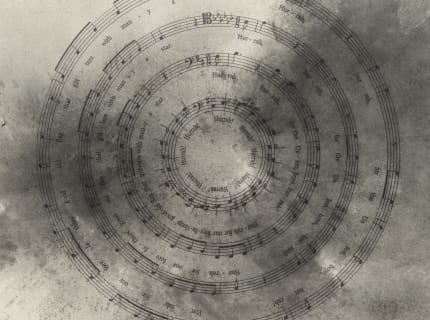Bethany Collins: Undercurrents
Alexander Gray Associates, New York presents Bethany Collins: Undercurrents, the artist’s first solo exhibition with the Gallery. Undercurrents features new cast paper works alongside a body of song-based drawings and compositions from the artist’s Antigone and Lost Friends series. These works mine a range of historic sources to uncover currents of resistance and perseverance while simultaneously exposing the cataclysmic forces—undertows of violence and conflict—that shaped them.
Speaking directly to these prevailing currents, many of Collins’s Antigone compositions focus on characters’ dissent, metaphorized as treacherous journeys across the sea. Collins creates these works by meticulously erasing handwritten passages from different translations of Sophocles’s tragedy. Rendered across multiple panels, she obscures every word of the text save for selected passages. These few legible lines illuminate fraught, uncertain courses, and find new resonance in today’s political climate. In contrast, Lost Friends isolates quotes from public notices placed by formerly enslaved individuals seeking their loved ones. Originally published in African American newspapers before the end of the Civil War through the 1920s, the series has a haunting charge. Centering the experiences of castaways of subjugation and war, it speaks to the primal fear of being set adrift, forever lost and unmoored.
Collins further expands on her investigations into the histories of the American South in her collection of song drawings. In these series, she engages with the concept of contrafactum, a musical term used to describe a song where the text is altered, but the melody remains the same. The drawings present Union renditions of “The Bonnie Blue Flag,” a song that was sung by Confederate soldiers during the Civil War, as well as “By and By the Roses Wither,” a popular nineteenth century American ballad. Obscuring the lyrics and scores of these airs with plume-like clouds of charcoal, Collins simultaneously evokes centuries-old acts of racial violence, as well as the tear gas fired on Black Lives Matter protesters. By allowing the present to be caught in the swirling eddies of the past, she reasserts the centrality of language as “… a prism through which to explore American history and the nuance of racial and national identities.”
Finally, in a radical departure from her text-based drawings, Collins’s Old Ship works are cast from handmade paper mixed with granite from a destroyed Confederate monument pulverized into dust—part of the artist’s first sculptural project to be presented by LAXART and the Museum of Contemporary Art, Los Angeles in 2025. Collaborating with Dieu Donné in Brooklyn, NY, Collins created these compositions from molds based on architectural details from the Old Ship AME Zion Church, the oldest Black church in the artist’s hometown of Montgomery, AL. Each cast pays homage to the building and congregation that hosted prominent Black speakers like Frederick Douglass, Senator Blanche K. Bruce, and Dr. Booker T. Washington.
Together, these four distinct bodies of work speak to the undercurrents of power, race, and violence that inform history. Executed as tributes, portraits, and portents, Collins’s poetic works emerge as evocative meditations on how the riptides of the past continue to give shape to the present.
Collins’s work is currently the subject of a solo exhibition America: A Hymnal at Peabody Essex Museum, Salem, MA (through 2024). Other recent one-person exhibitions include America: A Hymnal, Crystal Bridges Museum of American Art, Bentonville, AK (2021); Evensong, Frist Art Museum, Nashville, TN (2021); My Destiny Is In Your Hands, Montgomery Museum of Fine Arts, AL (2021); Chorus, Contemporary Art Museum St. Louis, MO (2019); Benediction, University of Kentucky Art Museum, Lexington, KY (2019); and Occasional Verse, The Center for Book Arts, New York, NY (2018); among others. Her works have been featured in numerous group exhibitions, including Monochrome Multitudes, Smart Museum of Art, The University of Chicago, IL (2022); The Dirty South: Contemporary Art, Material Culture, and the Sonic Impulse, Virginia Museum of Fine Arts, Richmond, VA (2021), traveled to Contemporary Arts Museum Houston, TX (2021), Crystal Bridges Museum of American Art, Bentonville, AR (2022), and Museum of Contemporary Art Denver, CO (2022); Direct Message: Art, Language, and Power, Museum of Contemporary Art Chicago, IL (2019); Between Words and Images, Montgomery Museum of Fine Arts, AL (2017); and Material Histories, The Studio Museum in Harlem, New York, NY (2014), among others. Collins’s work is represented in the collections of the Art Institute of Chicago, IL; Birmingham Museum of Art, AL; High Museum of Art, Atlanta, GA; Montgomery Museum of Fine Arts, AL; The Morgan Library & Museum, New York, NY; Peabody Essex Museum, Salem, MA; Pennsylvania Academy of the Fine Arts Museum, Philadelphia, PA; Philadelphia Museum of Art, PA; Saint Louis Art Museum, MO; Smart Museum of Art, The University of Chicago, IL; Speed Art Museum, Louisville, KY; and The Studio Museum in Harlem, New York, NY, among others. She is the recipient of many awards and grants, including the Gwendolyn Knight & Jacob Lawrence Prize, Seattle Art Museum, WA (2023); Joan Mitchell Fellowship (2022); Lucas Artist Fellowship, Montalvo Arts Center, Saratoga, CA (2019); Artadia Award, Chicago, IL and Atlanta, GA (2019 and 2014); Illinois Arts Council Artist Fellowship, Chicago, IL (2019); Foundation for Contemporary Arts Emergency Grant, New York, NY (2018); and Pollock-Krasner Foundation Grant (2015); among others. Bethany Collins is also represented by PATRON Gallery, Chicago, IL.


